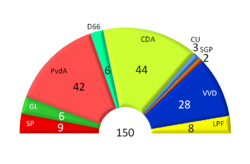- Dutch general election, 2003
-
Dutch general election, 2003 
2002 ← January 22, 2003 → 2006 All 150 seats to the House of Representatives
76 seats were needed for a majorityFirst party Second party Third party 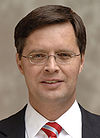


Leader Jan Peter Balkenende Wouter Bos Gerrit Zalm Party CDA PvdA VVD Leader since 2001 2002 2002 Last election 43 seats, 27,9% 23 seats, 15,1% 24 seats, 15,5% Seats won 44 42 28 Seat change +1 +19 +4 Popular vote 2.763.480 2.631.363 1.728.707 Percentage 28,6% 27,2% 17,9% Fourth party Fifth party Sixth party 


Leader Jan Marijnissen Mat Herben Femke Halsema Party SP LPF GL Leader since 1988 2002 2002 Last election 9 seats, 5,9% 26 seats, 17,0% 10 seats, 7,0% Seats won 9 8 8 Seat change 0 -18 -2 Popular vote 609.723 549.975 495.802 Percentage 6,3% 5,6% 5,1% Seventh party Eighth party Ninth party 
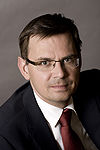
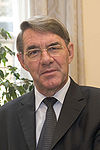
Leader Thom de Graaf André Rouvoet Bas van der Vlies Party D66 CU SGP Leader since 1998 2002 1986 Last election 7 seats, 5,1% 4 seats, 2,5% 2 seats, 1,7% Seats won 6 3 3 Seat change -1 -1 0 Popular vote 393,333 204,694 150.305 Percentage 4,0% 2,1% 1,5%
Seats
Prime Minister before election
Prime Minister
The General Election to the House of Representatives of the States-General of the Netherlands was held in the Netherlands on January 22, 2003.
Contents
Background
The election was held following the resignation of the first Balkenende cabinet on 16 October 2002 after conflicts attributed to the LPF, the new party of the already deceased Pim Fortuyn.
In the early days of the campaign the CDA of incumbent prime minister Jan Peter Balkenende and the VVD, the smallest coalition party, saw a major lead.
After TV debates the PvdA (which had experienced a landslide defeat in the 2002 general election) of opposition leader Wouter Bos caught up, overtaking the VVD and regaining some of the territory lost in the previous election. The PvdA also held a leadership election which got the party considerable attention.
Results
The LPF lost as spectacularly as it won in 2002, with its seat count dropping from 26 to 8.
The exciting race of which party would become the largest was eventually won by the CDA, which went from 43 to 44 seats, ensuring a continuation of Balkenende’s career as prime minister.
Most of the smaller parties on both the left and right side did not experience significant changes. Several other parties (among them Leefbaar Nederland, a 2002 newcomer) didn’t manage to get over the threshold and thus gained no seats. They are not listed here.
After severe disagreements had frustrated the formation of a CDA-PvdA cabinet, a CDA-VVD-D66 cabinet was formed on 27 May 2003, with Balkenende as prime minister.
National Summary
Summary of the 22 January 2003 Dutch House of Representatives election results Parties Lijsttrekker Votes Seats +/- Vote % Seat % Christian Democratic Appeal Jan Peter Balkenende 2,763,480 44 +1 28.6 29.3 Labour Party Wouter Bos 2,631,363 42 +19 27.3 28.0 People's Party for Freedom and Democracy Gerrit Zalm 1,728,707 28 +4 17.9 18.7 Socialist Party Jan Marijnissen 609,723 9 0 6.3 6.0 Pim Fortuyn List Mat Herben 549,975 8 -18 5.7 5.3 GreenLeft Femke Halsema 495,802 8 -2 5.1 5.3 Democrats 66 Thom de Graaf 393,333 6 -1 4.1 4.0 Christian Union André Rouvoet 204,694 3 -1 2.1 2.0 Political Reformed Party Bas van der Vlies 150,305 2 0 1.6 1.3 Total (turnout 80.0 %) 9,654,475 150 0 98.7 100.0 Parties
- Christian Democratic Appeal (Christen-Democratisch Appèl, CDA)
- Christian Union (ChristenUnie, CU)
- Democrats 66 (Democraten 66, D66)
- Green Left (GroenLinks, GL)
- Labour Party (Partij van de Arbeid, PvdA)
- Pim Fortuyn List (Lijst Pim Fortuyn, LPF)
- People's Party for Freedom and Democracy (Volkspartij voor Vrijheid en Democratie, VVD)
- Political Reformed Party (Staatkundig Gereformeerde Partij, SGP)
- Socialist Party (Socialistische Partij, SP)
Further reading
- Van Holsteyn, Joop J. M.; and Galen A. Irwin (January 2004). "The Dutch parliamentary elections of 2003". West European Politics 27 (1): 157–164. doi:10.1080/01402380412331280853.
External resources
- NSD: European Election Database - Netherlands publishes regional level election data (NUTS 1-3); allows for comparisons of election results, 1994-2010
Netherlands 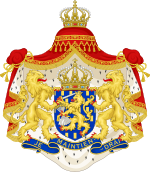
This article is part of the series:
Politics and government of
the NetherlandsConstitutionCabinetDecentralized gov'tForeign policyRelated subjects
 Elections and referendums in the Netherlands
Elections and referendums in the NetherlandsGeneral elections European elections Referendums Categories:- Elections in the Netherlands
- 2003 elections in the Netherlands
- 2003 in the Netherlands
Wikimedia Foundation. 2010.

